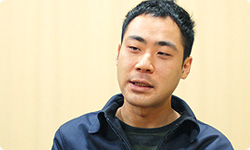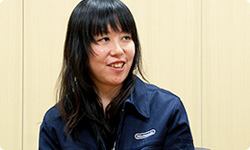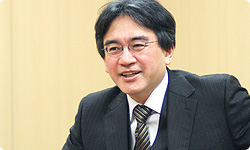5. What Hasn´t Changed in 25 Years
Matsuura-san, do any of the Super Skills movies that you thought up particularly stand out to you?
I think the most well-known one is Luigi bucket brigade .
Oh, right. The Yoshis swallow Luigi and pass him around like they’re playing catch.
Right. I proposed that and it got included among the Super Skills movies. The debuggers and I had a good time recording that one. Then there’s the one on the level where Bullet Bills fly in from left and right and Mario rises up vertically.
You jump from one Bullet Bill to the next.
Right. We had a different Hint Movie recorded for that level where you just went up by propeller, but when Amano-san sent us something he had recorded, we figured, “This is much better!” (laughs)
That one Hint Movie , right?
Yeah. So we scrapped the first Hint Movie we had thought of and went with Amano-san’s.
(laughs)
But then I was the one who almost cried! The video I had sent to Matsuura-san was incomplete. So then, while continuing my regular work, I had to complete that Hint Movie!
It became your responsibility.
Yeah. I was the one who hit on the idea, so I had to complete it.

I see. (laughs) Fujii-san, could you tell us what made you become a video game developer?
When I was little, I learned piano, but I hated to practice. All I would do is remember the songs that appeared in video games and play around with those. I would often play the Super Mario Bros. songs, and as I played them over and over, I stopped simply trying to play the songs and began to think that I’d like to put songs to video games or stories.
You could say that was the handiwork of (Koji) Kondo-san.17 17Koji Kondo: He is in the Software Development Department, Entertainment Analysis and Development Division. He has worked on the sound for the Super Mario Bros. and The Legend of Zelda series. One of the developers of Super Mario Bros.
Yeah. (laughs) When I tried to play the Super Mario Bros. songs, they were pretty difficult, so I played them over and over. Then when I got bigger and started thinking about my future, I remembered that and thought about going into work involving music. I thought it would be fun if I could make music like the music in video games that had excited me when I was child. Perhaps another reason I thought that was because I remembered video game music more than any other kind of music.
Because video game music is something you hear over and over again.
I played Super Mario All-Stars on Wii with my friends and even remembered all the music for games I didn’t have. I noticed myself singing the music as others played and I thought it was amazing how well I remembered it.
How were things after you entered Nintendo?
I thought sound production was incredibly interesting work. Before I came to Nintendo, I thought you just sat around alone coming up with songs, but I was pleased when I realised that actually a lot of the time the planner and programmer and designer are close at hand for consultation as you work.
The music and graphics and game mechanics don’t each exist on their own. They all connect in the video game to make an impression on the players, so you can’t just create the music in isolation.
Right. Everyone comes up with the game together, so it’s really fun.
And one of those people is Kondo-san, who made the Super Mario Bros. songs. What was it like working with the person who created the music that got you humming?
I actually sit next to Kondo-san now. It’s a weird feeling to sit next to the person who wrote those songs. (laughs) I had him listen to each song for New Super Mario Bros. Wii, which made me really nervous.

What did Kondo-san say about the songs you had made?
Sometimes he would give me concrete advice about the song and suggest something I could do, but other times he would just say, “Something isn’t quite right.” Kondo-san has an image inside of what the music for a Super Mario Bros. game should be like, so when a song isn’t right, it’s generally the case that you can’t just fix something specific, but rather something fundamental is wrong with the direction the song is taking.
When he says it isn’t right, you have to redo the whole thing, so it’s really hard for the person making the music. But when you’re unsure about a song you’ve made, you may feel like saying, “Please, criticise all you want!” (laughs)
Yeah. (laughs)
We’ve almost reached our final question. Super Mario Bros. was there with all of you from an early age, you grew up absorbed in playing it, and now you’re in a position to make Super Mario Bros. games. In the 25 years since the birth of Super Mario Bros., what elements of the games do you think haven’t changed? Let’s reverse the order this time and start with you, Fujii-san.
Okay. Um... I think one attraction of the game that has never changed is how whoever looks at them can tell in a glance what is going on. Even if you don’t know the rules of the game, the screen conveys what is going on and what needs to be done to overcome it. I think that’s why someone who is just watching can have fun, too.
That’s the viewpoint of Fujii-san from the gallery! (laughs)
Yeah. (laughs) And another thing that hasn’t changed is how you hardly ever think, “Why did I just lose?”
When you lose a turn, you don’t think, “But I didn’t do anything wrong!” Instead, you think, “I know what I did wrong.” So you want to try again.

I think so.
Something I think hasn’t changed in the Super Mario Bros. games is how when you mess up, you tend to let out a mangled cry.
Uh-huh. (laughs)
The other day, I was playing Super Mario All-Stars on Wii, and when I messed up, I shouted, “Oogeh!” My wife, who was in the next room, came running in with a worried expression on her face and said, “What’s the matter?!”
(laughs)
She asked, “Did something happen?!” (laughs) I couldn’t explain, though, how even though I knew there was a Koopa Troopa there, I had jumped there and failed.
(laughs)
You can’t help but cry out.
And that’s true for people watching from behind as well as for the players themselves.
Yeah. (laughs)
Something that I think hasn’t changed in the Super Mario Bros. series is how each course is short, so you can play them at ease. And there are always coins, and they contain a hidden message of sorts as to how and where you should jump.
The coins show you the route to take.
Right. And another big thing is how the Super Mario Bros. games incorporate new elements with the times, giving them strong appeal. That’s an element of Super Mario Bros. that I don’t think has changed.
How about you, Nishimura-san?
I think that no matter when you play the games, you can rest easy as you play. For example, when an old enemy appears in a new game, people who played the old games think, “Oh, I know that enemy!” and yet that enemy will strike new players as fresh and exciting. And you never have to use some particular technique to get past them. I think that’s something that has never changed.
Yeah. That poor Goomba is always there for you in the beginning so you can keep stomping on it. (laughs)
Exactly! (laughs)
